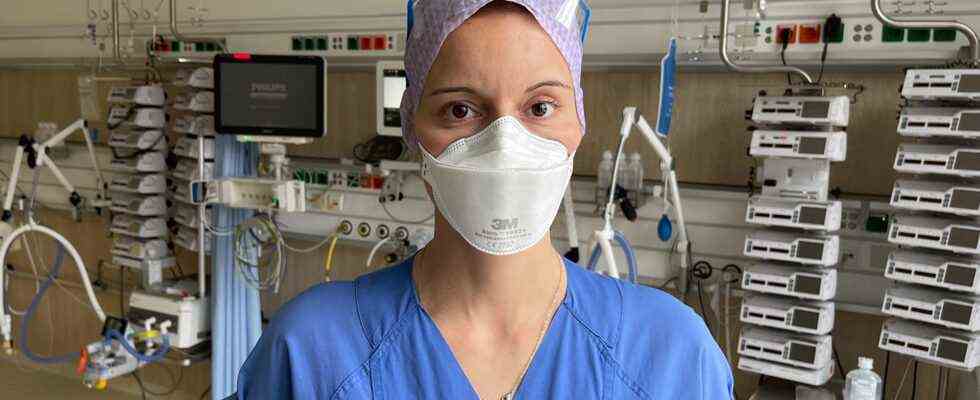in the middle
Status: 11/17/2021 10:38 a.m.
There are currently 19 Covid patients in the University Clinic in Dresden, 18 of which are unvaccinated. Michaela Strätz has been an intensive care nurse there for 13 years. How does she deal with the burden? And how about the death of patients?
Four intensive care nurses stand by the bed, two on each side. You count to three and turn the patient from stomach to back. A delicate moment. No hose may kink, no access may slip. For intensive care nurse Michaela Strätz, this is an act of strength. She has been working in the intensive care unit at the Dresden University Hospital for 13 years. She has been taking care of corona patients since the first wave.
The rapid increase in the number of patients came as a surprise to her: “It was clear that the fourth wave was coming. But I didn’t expect that it would hit us so quickly.” The numbers are now as high as they were last Christmas. She wonders where all this is going.
Incidence at 1000: The limits of medical care using the example of Dresden
J. Lange / I.Ströh, NDR, daily topics 10:15 p.m., November 16, 2021
18 out of 19 patients are unvaccinated
The summer and the associated relaxation are quickly forgotten, reports Strätz. In addition, there is the psychological burden because patients die again every day. “We are intensive care workers. We are always faced with death, but not in this abundance.”
There are currently 19 patients in the Dresden Corona intensive care unit, 18 of whom are unvaccinated. It’s a mental challenge for the team. Again and again they have to do with patients who still do not take Corona seriously. Relatives would sometimes call and ask if their loved one really had Corona, even though it was proven in the laboratory. Intensive care nurse Strätz has little understanding for this. But she could not get angry with every patient, that robbed her of too much energy that she needed to care for her patients. Despite all the frustration, she treats all patients equally.
Carnival? The nurse sees future patients
Peter Spieth is head of the intensive care unit at the Dresden University Hospital. He hopes that more people will get the vaccine so that the situation will ease up for them again. “So far, we have not yet given intensive inpatient treatment to healthy people who have been vaccinated.” Vaccinated patients who end up here would all have had previous illnesses. He gives examples: patients with organ transplants or a weakened immune system as a result of cancer.
The head of the intensive care unit, Peter Spieth, is following the situation with concern.
Image: Isabel Ströh, NDR
Intensive care nurse Strätz has been working in the clinic for 13 years. She thinks the current stress is too high.
Image: Isabel Ströh, NDR
In view of the overload in her intensive care unit, Michaela Strätz looks with concern at pictures from the carnival a week ago. “I love carnival myself. But the only thing I see there are the potential patients that we will have with us in the intensive care unit two weeks later.” She doesn’t want to go to the Christmas market this year either. It doesn’t feel right to her.
Unpredictable course of the disease
Around half of the patients die of a heart-lung machine. Intensive care nurse Strätz had fought for life for weeks: “You establish a connection with the patient. Some smile at you.” But the patient’s situation changes frequently. Patients whom she took care of in the evening may have died the next day. The course of the disease is unpredictable.
Meanwhile everyone is more routine, the cooperation with other clinics works well, reports intensive care physician Spieth. Nevertheless, the situation in many regions of Germany is tense. The occupancy of the intensive care units with corona patients has a direct impact on normal operations, including in Dresden. Every fifth unnecessary operation has already been postponed here. This means that they are in a significantly better position than other clinics. “We still have major operations. There are patients who suffer serious accidents, and they too need intensive medical care.”
“Home on all fours in the evening”
The nursing emergency exacerbates the situation. In the corona intensive care unit of the Dresden University Hospital, almost a third of the 30 possible beds are currently blocked. There is a shortage of nurses, according to Spieth. Nevertheless, one can react to the current development of corona patients and increase them, he assures.
More money for nurses is not the solution, says intensive care nurse Strätz. Of course, she is happy about a few euros more. “But that doesn’t solve the problem that the working conditions are such that you crawl home on all fours in the evening.” In order to make the job more attractive again, the working conditions would have to change. She herself began studying alongside work – to become a vocational school teacher. The workload as an intensive care nurse is too high to practice the job until retirement. But she never wants to give up her job entirely.

